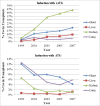Antibody immunosuppressive therapy in solid-organ transplant: Part I
- PMID: 20150766
- PMCID: PMC2840233
- DOI: 10.4161/mabs.2.2.11159
Antibody immunosuppressive therapy in solid-organ transplant: Part I
Abstract
Currently, a wide variety of both polyclonal and monoclonal antibodies are being routinely utilized to prevent and treat solid organ rejection. More commonly, these agents are also administered in order to delay introduction of calcineurin inhibitors, especially in patients with already compromised renal function. While these antibody therapies dramatically reduced the incidence of acute rejection episodes and improved both short and long-term graft survival, they are also associated with an increased incidence of opportunistic infections and neoplastic complications. Therefore, effective patient management must necessarily balance these risks against the potential benefits of the therapy.
Figures
Similar articles
-
Use of polyclonal/monoclonal antibody therapies in transplantation.Expert Opin Biol Ther. 2017 Mar;17(3):339-352. doi: 10.1080/14712598.2017.1283400. Epub 2017 Jan 30. Expert Opin Biol Ther. 2017. PMID: 28092486 Review.
-
The role of alemtuzumab in facilitating maintenance immunosuppression minimization following solid organ transplantation.Transpl Immunol. 2008 Nov;20(1-2):6-11. doi: 10.1016/j.trim.2008.09.003. Epub 2008 Sep 29. Transpl Immunol. 2008. PMID: 18824230
-
Multicenter trial exploring calcineurin inhibitors avoidance in renal transplantation.Transplantation. 2001 May 15;71(9):1282-7. doi: 10.1097/00007890-200105150-00017. Transplantation. 2001. PMID: 11397963 Clinical Trial.
-
Induction immunotherapy with IL-2Ra monoclonal antibody in kidney transplantation.Minerva Urol Nefrol. 2003 Mar;55(1):67-79. Minerva Urol Nefrol. 2003. PMID: 12773968 Review.
-
Immunosuppressive Therapy in Transplantation.Nurs Clin North Am. 2016 Mar;51(1):107-20. doi: 10.1016/j.cnur.2015.10.008. Epub 2016 Jan 13. Nurs Clin North Am. 2016. PMID: 26897428 Review.
Cited by
-
Pharmacovigilance Analysis of Serious Adverse Events Reported for Biologic Response Modifiers Used as Prophylaxis against Transplant Rejection: a Real-World Postmarketing Experience from the US FDA Adverse Event Reporting System (FAERS).Int J Organ Transplant Med. 2013;4(2):62-71. Int J Organ Transplant Med. 2013. PMID: 25013655 Free PMC article.
-
Immunosuppression trends in solid organ transplantation: The future of individualization, monitoring, and management.Pharmacotherapy. 2021 Jan;41(1):119-131. doi: 10.1002/phar.2481. Epub 2020 Dec 30. Pharmacotherapy. 2021. PMID: 33131123 Free PMC article. Review.
-
Non-melanoma skin cancer in Portuguese kidney transplant recipients - incidence and risk factors.An Bras Dermatol. 2016 Jul-Aug;91(4):455-62. doi: 10.1590/abd1806-4841.20164891. An Bras Dermatol. 2016. PMID: 27579740 Free PMC article.
-
Antibody immunosuppressive therapy in solid organ transplant: Part II.MAbs. 2010 Nov-Dec;2(6):607-12. doi: 10.4161/mabs.2.6.13586. Epub 2010 Nov 1. MAbs. 2010. PMID: 20948291 Free PMC article. Review.
-
Regulation of human T cell responses by dNP2-ctCTLA-4 inhibits human skin and microvessel graft rejection.Biomaterials. 2018 Nov;183:128-138. doi: 10.1016/j.biomaterials.2018.08.049. Epub 2018 Aug 21. Biomaterials. 2018. PMID: 30165256 Free PMC article.
References
-
- Murray JE, Merrill JP, Harrison JH, Wilson RE, Dammin GJ. Prolonged survival of human-kidney homografts by immunosuppressive drug therapy. N Engl J Med. 1963;268:1315–1323. - PubMed
-
- Calne RY, Rolles K, White DJ, Thiru S, Evans DB, McMaster P, et al. Cyclosporin A initially as the only immunosuppressant in 34 recipients of cadaveric organs: 32 kidneys, 2 pancreases and 2 livers. Lancet. 1979;8151:1033–1036. - PubMed
-
- Norman D, Turka L. Primer on Transplantation. Wiley Blackwell; 2001.
-
- Collins WA, Humphreys RM, Davis MB, Ibele WE, Dworkin M, Kinsey J, et al. The Crime of Saving Lives: The FDA, John Najarian and Minnesota ALG. Arch Surg. 1996;131:451–452. - PubMed
-
- Wechter WJ, Brodie JA, Morrell RM, Rafi M, Schultz JR. Antithymocyte Globulin (ATGAM) in renal allograft recipients. Multicenter trials using a 14-dose regimen. Transplantation. 1979;28:294–302. - PubMed
Publication types
MeSH terms
Substances
LinkOut - more resources
Full Text Sources
Other Literature Sources
Medical


